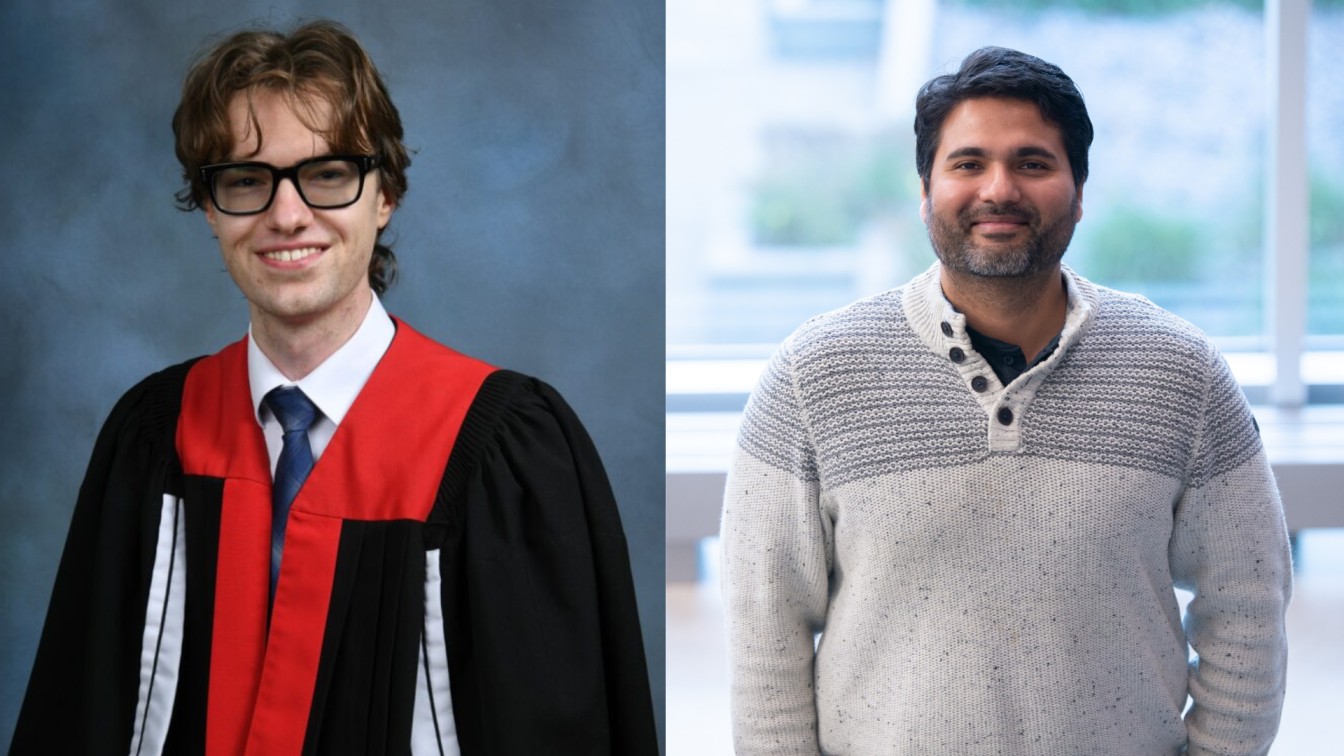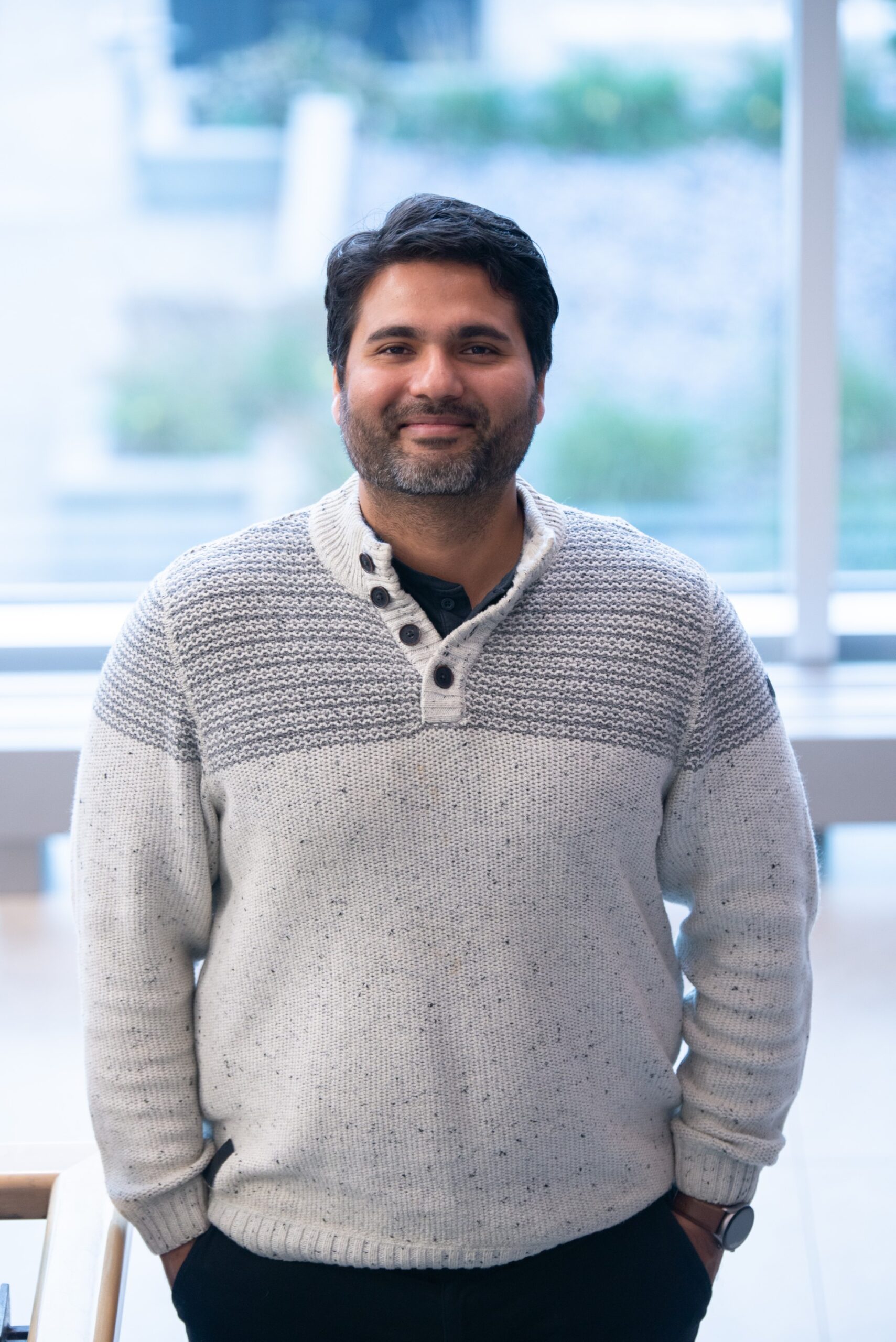
Two Bachelor of Technology Degree Completion Program Software Engineering Technology students have developed an innovative tool with the potential to transform how to navigate course selection and academic pathways. Mitchell Culligan and Kuwar Dalal created AcademicGPT, an offline generative AI-powered chatbot that helps McMaster students during their academic journey.
The project, developed as part of their final presentation in the program, was guided by Seshasai Srinivasan, professor and program chair. It began with a simple yet ambitious idea: to help students make informed decisions about their courses and academic paths. The result? A tool that is not only innovative but tailored to meet the needs of McMaster’s academic community.
“During our time at McMaster, we noticed how challenging it could be for students to choose the right courses or even understand what each course offered,” says Dalal. “We wanted to create something that could act as a ‘General Purpose Academic Advisor,’ providing students with detailed insights into course offerings, prerequisites and even potential career paths.”
Going offline
What sets AcademicGPT apart from other AI-powered tools is its offline functionality. Unlike most AI chatbots that rely on cloud-based data processing, AcademicGPT operates entirely offline, ensuring that personal and sensitive information remains secure.
This was a crucial aspect of the design for Culligan and Dalal, who were aware of the privacy concerns surrounding AI technology.
“AcademicGPT’s ability to function offline is a game-changer,” explains Culligan. “It ensures that students’ personal data stays safe while still providing them with the information they need. We wanted to make sure that our tool could be adopted by anyone who values data security, including large organizations.”
The development of AcademicGPT came with some challenges. The team had to navigate complex ethical considerations, particularly around the accuracy and authenticity of the chatbot’s responses. To address these concerns, they implemented industry-standard AI guardrails and conducted extensive testing to ensure that AcademicGPT’s outputs were both reliable and relevant.
“Ethics were at the forefront of our minds throughout this project,” says Dalal. “We knew that creating an AI tool that students would rely on required a rigorous approach to ensuring its accuracy. We also gave users the ability to verify the authenticity of the responses they receive.”
The pair also received express consent from McMaster’s Data Governance team to carry out the project.
Building on a solid educational foundation
Culligan and Dalal credit much of their success to the education they received in the DCP Software Engineering program. The program, known for its focus on practical, hands-on learning, provided them with the skills and knowledge needed to bring AcademicGPT to life.
“We drew upon what we learned in nearly all of our courses for this project, says Dalal. “Without the foundation provided by the DCP Software program, we wouldn’t have known where to begin.”
The pair also highlight the impact of their professors, noting, “we were fortunate to have had exceptional professors, including Seshasai Srinivasan, Jeff Fortuna, Apurva Kumar, Alireza Fatehi and Kevin Browne, whose teachings played a vital role in the success of this project.”
Srinivasan also expressed his admiration for the duo’s work.
“Mitch and Kuwar summoned every bit of the software curriculum they mastered over the years to create an outstanding product in the form of MAC-GPT,” he says, “It is evidence of their attitude to keep advancing their learning and setting excellence as the bar.”
“Mitch and Kuwar summoned every bit of the software curriculum they mastered over the years to create an outstanding product in the form of AcademicGPT,” he says, “It is evidence of their attitude to keep advancing their learning and setting excellence as the bar.”


A tool with far-reaching potential
As AcademicGPT continues to evolve, Culligan and Dalal are optimistic about its future applications. They have already attracted interest from the private sector, with companies eager to explore how AcademicGPT’s offline capabilities can be adapted for corporate environments. The duo also hopes that future students will build on their work, further develop AcademicGPT and explore new features and functionalities.
“We’re still amazed at how well this project turned out,” says Culligan “Working on AcademicGPT has clarified our future career goals, and we’re both excited to continue working in this field. We believe that generative AI has incredible potential, not just in education but across all sectors.”
Reflecting on his journey, Dalal adds, “This project has been more than just an academic exercise for us. It’s been a real-world challenge that has allowed us to make a tangible impact on our community. We’re proud of what we’ve achieved and look forward to seeing where AcademicGPT goes next.”
Watch the short clip below to witness AcademicGPT in action.
